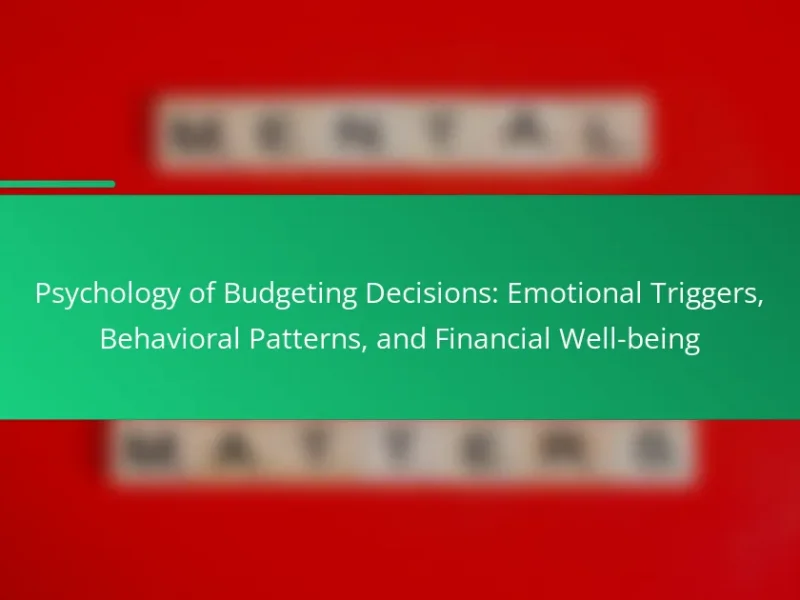Financial decisions can significantly impact mental well-being, leading to stress, anxiety, and empowerment. This article explores the stress associated with financial uncertainty, the unique factors contributing to anxiety, and the psychological traits that foster financial empowerment. Understanding these dynamics can help individuals make informed choices that enhance their overall financial health and emotional stability. Recognising the mental aspects of money management is crucial for navigating financial challenges effectively.

What are the common mental impacts of financial decisions?
Financial decisions commonly lead to stress, anxiety, and a sense of empowerment. Stress arises from financial uncertainty and the pressure to make sound choices. Anxiety can stem from fear of financial failure or poor decision-making. Conversely, making informed financial choices can foster a sense of empowerment and control over one’s financial future. Understanding these impacts is crucial for managing mental well-being in financial contexts.
How does stress manifest in financial choices?
Stress significantly influences financial choices, often leading to impulsive decisions and avoidance behaviours. Individuals under stress may prioritise short-term relief over long-term financial stability, resulting in detrimental outcomes. Research shows that stress can impair judgment, causing people to overlook critical financial planning aspects. Furthermore, chronic stress can create a cycle of anxiety that complicates financial empowerment, making it harder to achieve financial goals.
What role does anxiety play in money management?
Anxiety significantly influences money management by impairing decision-making and increasing stress. Financial anxiety can lead to avoidance behaviours, such as neglecting bills or overspending to alleviate stress temporarily. Research shows that individuals with high anxiety levels often experience difficulty in budgeting and financial planning. This can result in a cycle of financial instability, further exacerbating anxiety. Understanding this relationship empowers individuals to seek strategies that mitigate anxiety, enhancing their financial decision-making skills.
Can financial decisions lead to feelings of empowerment?
Yes, financial decisions can lead to feelings of empowerment. When individuals make informed choices about their money, they often experience increased confidence and control over their lives. This sense of empowerment stems from understanding financial options and the impact of those choices on personal goals. Research indicates that proactive financial management reduces stress and anxiety, contributing to overall well-being. Empowerment through financial decisions can enhance life satisfaction and motivate individuals to pursue their aspirations.

What are the universal attributes of money-related stress?
Financial decisions often lead to universal attributes of stress, including anxiety, uncertainty, and feelings of helplessness. These attributes manifest as constant worry about financial stability, fear of making poor decisions, and a sense of loss of control over one’s financial future. Research indicates that nearly 72% of individuals experience significant stress related to money, highlighting its pervasive impact on mental health. The unique attribute of this stress is its ability to affect interpersonal relationships, as financial strain often leads to conflicts with partners and family members.
How do financial pressures affect mental health?
Financial pressures significantly impact mental health, often leading to stress and anxiety. Individuals facing financial difficulties may experience feelings of helplessness, which can diminish their overall well-being. Research indicates that financial stress can trigger mental health disorders, including depression and anxiety, affecting decision-making and relationships. Conversely, financial empowerment through informed choices can enhance self-esteem and reduce anxiety, illustrating a complex relationship between financial decisions and mental health outcomes.
What are the psychological effects of debt?
Debt significantly impacts mental health, often leading to stress and anxiety. Individuals facing financial burdens may experience feelings of helplessness and decreased self-worth. Research indicates that chronic debt correlates with higher levels of anxiety and depression. Empowerment can arise from effective debt management, promoting a sense of control and improved mental well-being.
How does financial insecurity influence decision-making?
Financial insecurity significantly impacts decision-making by increasing stress and anxiety. When individuals face financial instability, their cognitive resources become strained, leading to less effective decision-making. This stress can result in impulsive choices, such as overspending or avoidance of necessary financial planning. Conversely, some may experience empowerment through informed decision-making, seeking strategies to improve their financial situation. Research shows that financial stress can reduce cognitive function, affecting long-term planning and risk assessment. Thus, understanding the mental impact of financial decisions is crucial for developing effective coping strategies.

What unique factors contribute to anxiety in financial decisions?
Unique factors contributing to anxiety in financial decisions include uncertainty, perceived loss, and social comparison. Uncertainty arises from unpredictable markets, leading to stress. Perceived loss amplifies anxiety as individuals fear financial setbacks. Social comparison fosters feelings of inadequacy, impacting decision-making confidence. These elements intertwine, creating a complex emotional landscape around financial choices.
How do personal values shape financial anxiety?
Personal values significantly shape financial anxiety by influencing decision-making and risk perception. Individuals with strong values around security may experience heightened anxiety during financial uncertainty. Conversely, those prioritising growth may view financial risks as opportunities. Research indicates that aligning financial choices with personal values can reduce stress and foster empowerment. Understanding this relationship helps individuals manage anxiety effectively, leading to healthier financial behaviours.
What impact does societal pressure have on financial choices?
Societal pressure significantly influences financial choices, often leading to stress and anxiety. Individuals may feel compelled to conform to social norms, impacting their spending and saving habits. This pressure can create a cycle of financial stress, diminishing overall empowerment in decision-making. Studies indicate that 70% of people report feeling anxiety related to financial expectations from peers or society. As a result, understanding and mitigating these pressures can enhance financial well-being and personal empowerment.

What rare psychological traits influence financial empowerment?
Rare psychological traits that influence financial empowerment include resilience, optimism, and self-efficacy. Resilience helps individuals recover from financial setbacks, fostering a proactive approach to money management. Optimism enables a positive outlook on financial futures, encouraging risk-taking and investment. Self-efficacy enhances confidence in making financial decisions, leading to better outcomes. These traits collectively contribute to a strong financial mindset, essential for navigating economic challenges effectively.
How does financial literacy correlate with mental well-being?
Financial literacy significantly enhances mental well-being by reducing stress and anxiety related to money management. Individuals with strong financial knowledge feel more empowered in their financial decisions, leading to improved emotional health. Studies show that financial stress is a leading cause of anxiety, and those lacking financial literacy often experience higher levels of stress. In contrast, increased financial knowledge equips individuals with tools to make informed decisions, fostering a sense of control and stability. This empowerment directly correlates with enhanced mental well-being, creating a positive feedback loop where improved financial health supports better mental health.
What role do personal experiences play in shaping financial confidence?
Personal experiences significantly influence financial confidence by shaping perceptions of money management. Positive experiences can lead to empowerment, while negative encounters often result in stress and anxiety. For instance, individuals who have successfully navigated financial challenges may develop resilience and a proactive approach to future decisions. Conversely, those with a history of financial setbacks might experience self-doubt and avoidance. Research indicates that emotional responses to past financial decisions directly affect current behaviour, highlighting the importance of personal narratives in financial confidence.

How can understanding money’s mental impact improve decision-making?
Understanding money’s mental impact can enhance decision-making by reducing stress and anxiety while fostering empowerment. Recognising how financial choices affect emotions helps individuals make more informed and confident decisions. For instance, awareness of financial stress can lead to better budgeting and spending habits. Research indicates that individuals who feel empowered in their financial decisions report lower anxiety levels and greater satisfaction with their choices. This empowerment can stem from education, financial planning, and developing a positive mindset towards money. By addressing the mental aspects of financial decisions, individuals can improve their overall well-being and make choices that align with their goals.
What strategies can reduce stress related to financial choices?
To reduce stress related to financial choices, consider these effective strategies. Practice budgeting to gain control over finances. Engage in mindfulness techniques to alleviate anxiety. Seek professional financial advice for informed decisions. Build an emergency fund to enhance financial security. Establish clear financial goals to provide direction and purpose.
How can individuals cultivate empowerment in their financial lives?
Individuals can cultivate empowerment in their financial lives by adopting proactive financial habits. Setting clear financial goals enhances focus and motivation. Tracking expenses and income provides insight into spending patterns, reducing anxiety. Educating oneself about financial concepts builds confidence in decision-making. Seeking support from financial advisors or communities fosters a sense of belonging and accountability. Regularly reviewing financial progress instills a sense of achievement, reinforcing empowerment.
What are practical steps for enhancing financial literacy?
To enhance financial literacy, individuals should take actionable steps that reduce stress and anxiety while fostering empowerment. Start by setting clear financial goals, which provide direction and motivation. Next, seek educational resources such as books, online courses, or financial workshops that cover budgeting, investing, and saving strategies. Regularly tracking expenses helps identify spending patterns and areas for improvement. Additionally, engaging in discussions with knowledgeable individuals or financial advisors can provide valuable insights and support. Finally, practice mindfulness techniques to manage stress associated with financial decisions, promoting a healthier relationship with money.
How can mindfulness practices support better financial decisions?
Mindfulness practices enhance financial decision-making by reducing stress and anxiety, leading to more empowered choices. Techniques such as meditation and focused breathing help individuals approach financial matters with clarity. Research shows that mindfulness can improve focus and emotional regulation, which are crucial for assessing financial risks and opportunities. As a result, individuals are more likely to make informed and balanced financial decisions.
What common mistakes should be avoided in financial decision-making?
To make sound financial decisions, avoid common mistakes that can lead to stress and anxiety. Key errors include not setting clear financial goals, failing to create a budget, ignoring the importance of an emergency fund, and succumbing to emotional spending. These missteps can undermine empowerment in financial choices and lead to long-term consequences. Prioritise informed decision-making by assessing risks and seeking professional advice when necessary.
What expert insights can guide better mental health in financial choices?
Expert insights emphasise that understanding the mental impact of financial decisions can significantly reduce stress and anxiety. Recognising triggers, such as overspending or debt, empowers individuals to make informed choices. Mindfulness practices can enhance emotional well-being, leading to better financial outcomes. Additionally, seeking support from financial advisors or mental health professionals can provide tailored strategies for managing financial-related stress.


